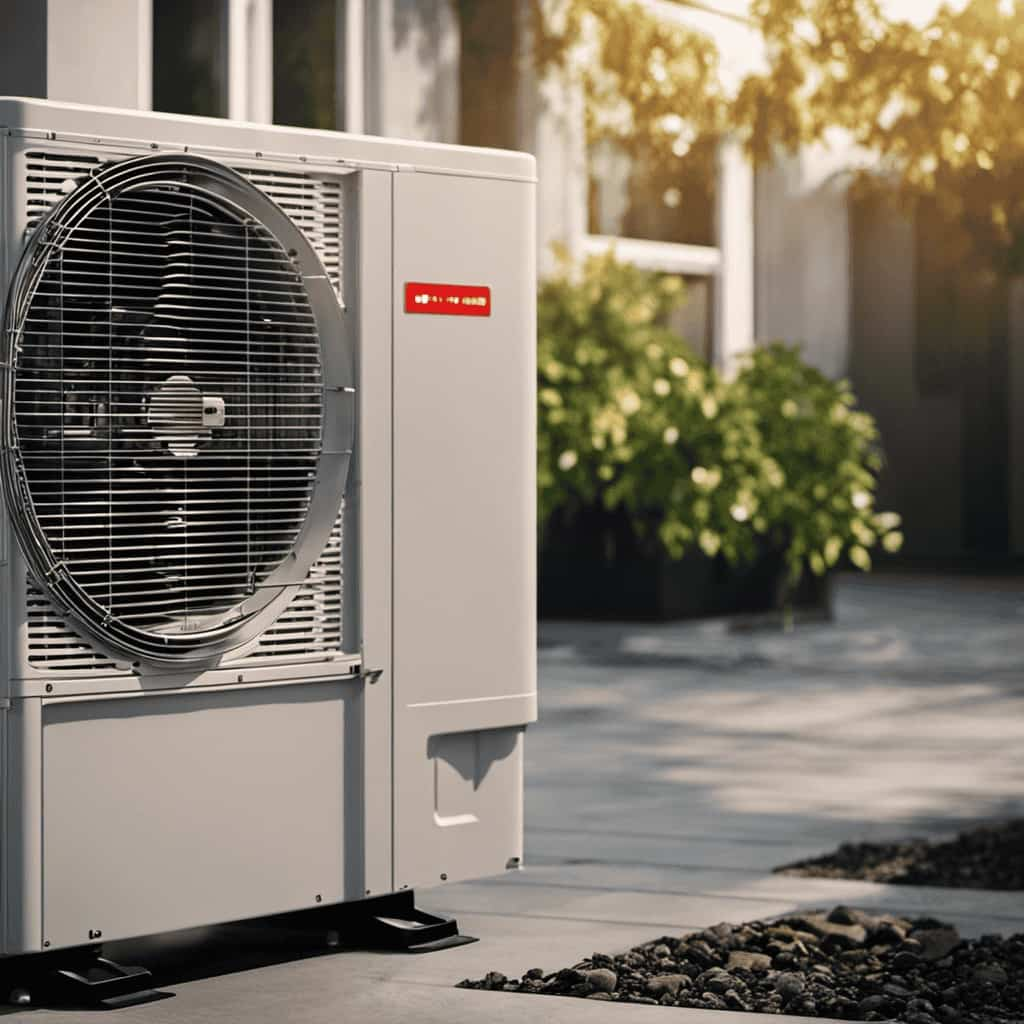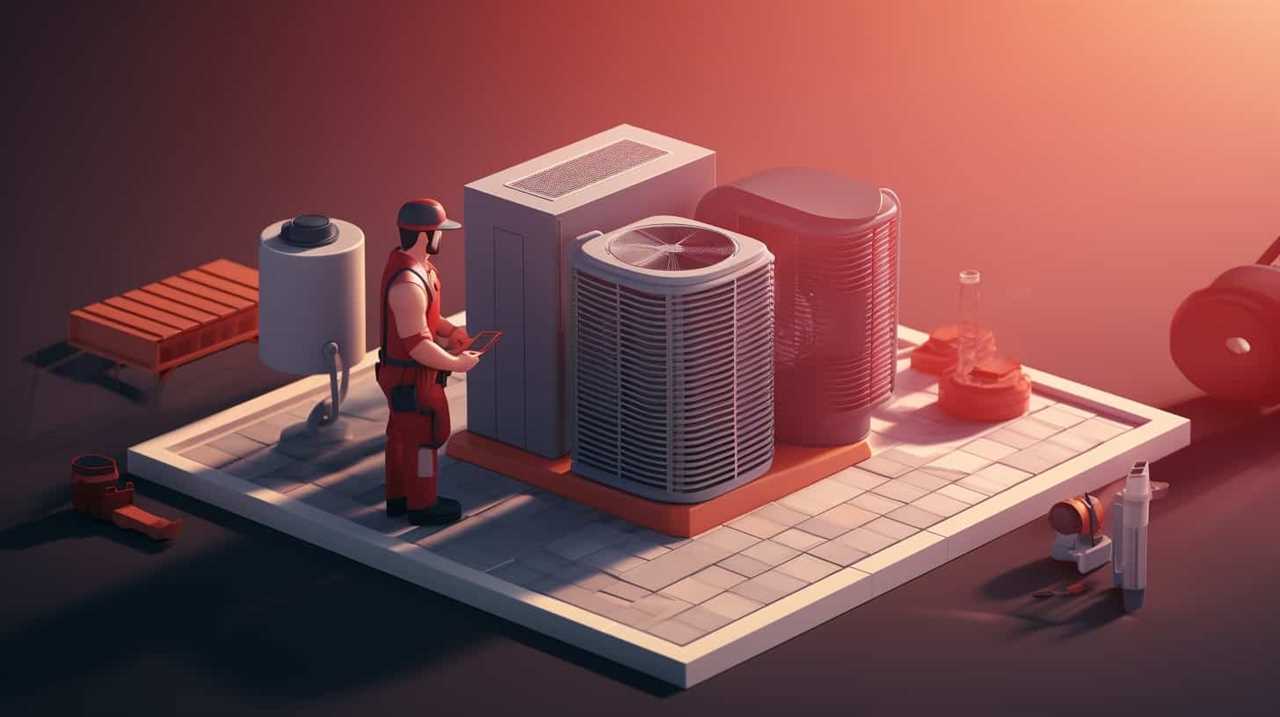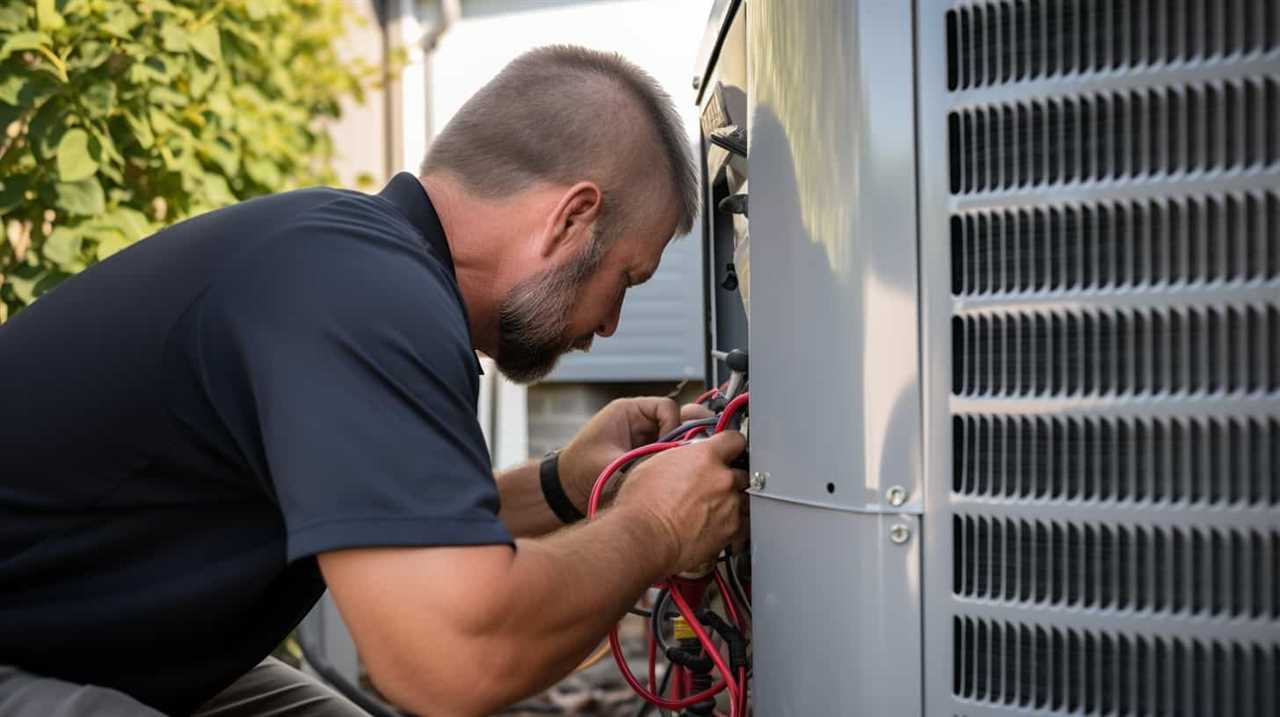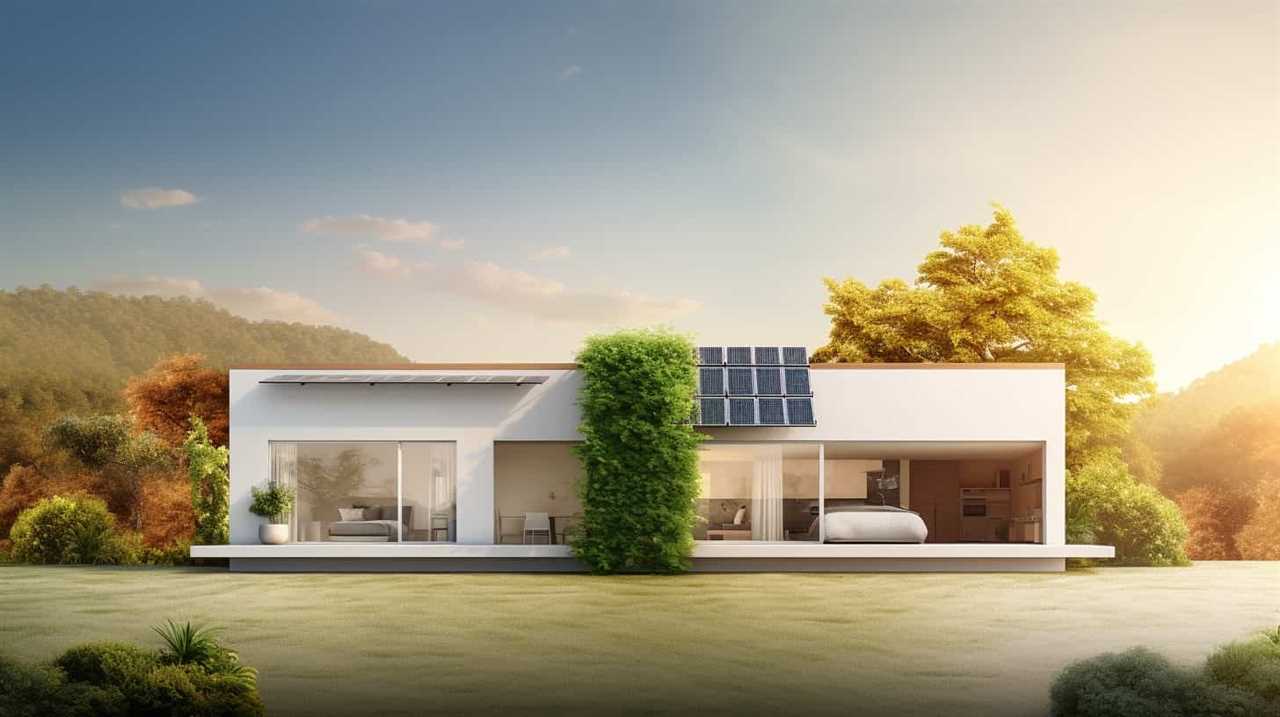Energy Efficiency
Revolutionize Your Comfort: Maximizing Heat Pump Efficiency

Are you sick of feeling cold in your own house? Stop searching! We’re here to transform your comfort by optimizing heat pump effectiveness.
In this article, we’ll guide you through the basics of heat pumps, help you choose the right size for your home, and provide tips on optimizing operation for maximum efficiency.
With regular maintenance and proper insulation, you’ll be able to enjoy a warm and cozy home all year round.
Let’s get started!

Key Takeaways
- Heat pump maintenance is crucial for optimal performance and energy efficiency.
- Choosing the right size heat pump for your home is essential for efficiency and comfort.
- Setting the thermostat to the recommended temperature of 68 degrees Fahrenheit can optimize heat pump operation.
- Utilizing energy-saving features and other efficiency enhancements can maximize heat pump efficiency and reduce energy bills.
Understanding Heat Pump Basics
We’ll start by explaining the basics of how a heat pump works. A heat pump is a device that transfers heat from one place to another, providing heating or cooling for a space. It works by extracting heat from the air, ground, or water, and then transferring it to the desired location.
Heat pump installation involves selecting the right size and type of heat pump for your specific needs, as well as ensuring proper placement and connection to the existing heating or cooling system.
Regular heat pump maintenance is crucial to ensure optimal performance and energy efficiency. This includes cleaning or replacing air filters, checking refrigerant levels, and inspecting the system for any signs of wear or damage.
Choosing the Right Size Heat Pump for Your Home
To ensure optimal performance, it’s crucial to choose the right size heat pump for our home. When it comes to heat pump installation, proper sizing is essential for efficiency and comfort. Here are four factors to consider when determining the right size heat pump for your home:

-
Square footage: Calculate the total square footage of your home to determine the heat pump capacity needed.
-
Climate: Consider the climate of your region. Warmer climates require less heating capacity, while colder climates require more.
-
Insulation: Evaluate the insulation in your home. Well-insulated homes may require a smaller heat pump, while poorly insulated homes may need a larger one.
-
Window and door quality: Assess the quality of your windows and doors. Energy-efficient windows and doors can affect the heat loss or gain in your home, impacting heat pump sizing.

Optimizing Heat Pump Operation for Maximum Efficiency
When it comes to optimizing heat pump operation for maximum efficiency, there are several key points to consider.
First, setting the ideal temperature is crucial in order to balance comfort and energy consumption.
Additionally, proper maintenance techniques, such as regular filter cleaning and system inspections, can greatly impact the efficiency of your heat pump.
Lastly, understanding and utilizing energy-saving features, such as programmable thermostats and variable-speed compressors, can further enhance the overall efficiency of your system.

Ideal Temperature Settings
Our recommended temperature setting for maximum heat pump efficiency is 68 degrees Fahrenheit. By programming your thermostat to this temperature, you can optimize the operation of your heat pump while minimizing energy consumption.
Here are four reasons why this temperature setting is ideal:
-
Energy Efficiency: Setting your thermostat to 68 degrees Fahrenheit allows your heat pump to work efficiently without excessive energy consumption.
-
Comfort: This temperature provides a comfortable indoor environment for most individuals while still being energy-conscious.

-
Cost Savings: Maintaining a consistent temperature of 68 degrees Fahrenheit can help lower your heating costs.
-
Heat Pump Lifespan: By operating your heat pump at this temperature, you can potentially extend its lifespan and reduce the need for repairs or replacements.
Proper Maintenance Techniques
Regular maintenance is essential for maximizing the efficiency of your heat pump and ensuring optimal operation. By following proper maintenance procedures and employing effective troubleshooting techniques, you can enhance the performance and longevity of your heat pump.
One important maintenance task is regularly cleaning or replacing the air filters. Clogged filters can restrict airflow and decrease efficiency.

Additionally, inspecting and cleaning the outdoor unit is crucial to remove any debris or obstructions that could hinder its function. It’s also recommended to check the refrigerant levels and ensure they’re within the manufacturer’s specifications.
Regularly inspecting electrical connections, lubricating moving parts, and testing the thermostat can help identify and resolve potential issues before they become major problems.
Energy-Saving Features Explained
We can maximize heat pump efficiency by utilizing energy-saving features and optimizing its operation. By taking advantage of smart technology and energy-saving features, we can ensure that our heat pump operates at its highest level of efficiency. Here are four key energy-saving features explained:
-
Programmable Thermostat: This feature allows you to set different temperatures for different times of the day, ensuring that your heat pump is only running when needed.

-
Variable Speed Compressor: This feature adjusts the speed of the compressor based on the heating or cooling demands of your home, resulting in energy savings and increased comfort.
-
Dual Fuel Capability: This feature allows your heat pump to switch to a backup heating source, such as a gas furnace, when outside temperatures drop too low for efficient heat pump operation.
-
Energy Monitoring: Some heat pumps have built-in energy monitoring capabilities, allowing you to track your energy usage and make adjustments to optimize efficiency.
By understanding and utilizing these energy-saving features, we can ensure that our heat pump operates at maximum efficiency, resulting in lower energy bills and increased comfort.

Now, let’s explore some regular maintenance tips for a well-functioning heat pump.
Regular Maintenance Tips for a Well-Functioning Heat Pump
To ensure optimal performance and extend the lifespan of your heat pump, regular maintenance is essential. Seasonal upkeep essentials include:
- Cleaning or replacing air filters
- Inspecting and cleaning the outdoor unit
- Checking the refrigerant levels
Troubleshooting common issues such as abnormal noises, insufficient heating or cooling, or frequent cycling can help identify potential problems and prevent costly repairs.
Seasonal Upkeep Essentials
Our maintenance checklist outlines essential tasks for keeping your heat pump in optimal condition throughout the year. Regular servicing and proper cleaning are crucial to ensure the efficiency and longevity of your heat pump. Here are the seasonal upkeep essentials you need to include in your maintenance routine:

-
Clean or replace air filters: Clogged filters restrict airflow and reduce efficiency. Cleaning or replacing them regularly promotes better performance.
-
Inspect and clean outdoor unit: Remove any debris or vegetation around the outdoor unit, and clean the coils to prevent airflow blockages.
-
Check refrigerant levels: Low refrigerant levels can indicate a leak and reduce heat pump efficiency. Regularly inspect and top up refrigerant levels as needed.
-
Test thermostat and controls: Ensure your thermostat is calibrated correctly and all controls are functioning properly to maintain accurate temperature settings.

By following these maintenance tips, you can prevent potential issues and maximize the efficiency of your heat pump.
Now, let’s delve into troubleshooting common issues that may arise.
Troubleshooting Common Issues
Let’s address common issues and provide regular maintenance tips to ensure a well-functioning heat pump.
One common issue that homeowners may encounter with their heat pumps is inconsistent temperatures. If you notice that certain areas of your home are significantly warmer or cooler than others, it could be a sign of a problem with your heat pump. This issue could be caused by a variety of factors, such as a malfunctioning thermostat, dirty filters, or a refrigerant leak.

Regularly checking and cleaning your filters, as well as scheduling professional maintenance checks, can help prevent and address these issues.
Another common issue to be aware of is strange noises coming from your heat pump. These noises could indicate problems with the compressor, fan motor, or other components. If you hear any unusual sounds, it’s important to have a qualified technician inspect and service your heat pump promptly.
Insulation and Sealing: The Key to Heat Pump Efficiency
High-quality insulation and proper sealing are crucial for maximizing the efficiency of your heat pump. Without adequate insulation and sealing, your heat pump will have to work harder to maintain the desired temperature, leading to increased energy consumption and higher utility bills.
Here are four key factors to consider when it comes to insulation and sealing:

-
Air leakage: Identify and seal any gaps or cracks in your home’s walls, windows, and doors to prevent air leakage. This will help maintain a consistent temperature and reduce the workload on your heat pump.
-
Insulation materials: Choose insulation materials with a high R-value, such as fiberglass or spray foam, to effectively trap heat and prevent it from escaping. Properly insulating your walls, attic, and floors will improve the overall efficiency of your heat pump.
-
Duct insulation: Insulate your ductwork to prevent heat loss or gain during the distribution of conditioned air. Well-insulated ducts will ensure that the air reaches its intended destination without any energy waste.
-
Vapor barriers: Install vapor barriers in areas prone to moisture, such as basements and crawl spaces, to prevent moisture from seeping into your home. Moisture infiltration can decrease the effectiveness of insulation and lead to mold growth.

Utilizing Programmable Thermostats for Energy Savings
We can achieve energy savings by effectively utilizing programmable thermostats. These devices allow us to schedule temperature adjustments throughout the day, ensuring that we only use energy when necessary. Smart thermostats take this concept even further by learning our habits and adjusting settings automatically for maximum efficiency. By implementing energy-saving strategies with programmable thermostats, we can significantly reduce our heating and cooling costs.
Here is a table that illustrates the benefits of smart thermostats:
| Benefits of Smart Thermostats |
|---|
| Energy savings |
| Increased comfort |
| Remote access and control |
Smart thermostats not only help us save energy, but they also enhance our overall comfort by maintaining consistent temperatures. With remote access and control, we can adjust settings from anywhere using our smartphones, ensuring that our homes are always at the perfect temperature.
Transitioning into the next section, let’s now explore the concept of harnessing the power of heat pump zoning.

Harnessing the Power of Heat Pump Zoning
To optimize heat pump efficiency, we can maximize comfort and energy savings by strategically dividing our home into separate zones. Heat pump zoning offers several benefits and plays a crucial role in optimizing heat pump performance. Here’s how we can make the most out of heat pump zoning:
-
Improved energy efficiency: By creating separate zones, we can heat or cool only the rooms that are in use, reducing energy waste.
-
Personalized comfort: Each zone can be set to different temperatures, allowing individuals to customize their comfort levels.
-
Reduced wear and tear: Heat pump zoning prevents unnecessary cycling, reducing the strain on the system and extending its lifespan.

-
Lower energy bills: By optimizing heat pump zoning, we can significantly reduce energy consumption, leading to lower utility bills.
By harnessing the power of heat pump zoning, we can create a more comfortable and energy-efficient home environment.
Now, let’s explore how we can further enhance heat pump efficiency by supplementing it with solar energy.
Supplementing Heat Pump Efficiency With Solar Energy
By utilizing solar energy, we can enhance the efficiency of our heat pump and reduce our reliance on traditional energy sources. One way to achieve this is through solar panel installation. Installing solar panels on your property allows you to harness the power of the sun and convert it into electricity, which can then be used to power your heat pump. This not only reduces your carbon footprint but also lowers your energy bills.

Additionally, the government offers various incentives to encourage the adoption of solar energy, such as tax credits and rebates. These incentives can offset the initial cost of solar panel installation and make it a more affordable option for homeowners.
Transitioning to the subsequent section, let’s now explore geothermal heat pump systems and their benefits.
Exploring Geothermal Heat Pump Systems
Utilizing geothermal heat pump systems can significantly enhance the efficiency of our heating and cooling systems while reducing our reliance on traditional energy sources. Geothermal heat pumps utilize the constant temperature of the earth to provide heating and cooling for our homes. Here are four key points to consider when exploring geothermal heat pump systems:
-
Geothermal heat pump maintenance: Regular maintenance is crucial to ensure optimal performance and longevity of your geothermal heat pump system. This includes regular filter cleaning or replacement, checking refrigerant levels, and inspecting the system for any leaks or malfunctions.

-
Geothermal heat pump installation: Proper installation is essential for the efficient operation of your geothermal heat pump system. It involves drilling boreholes, installing the heat exchanger, and connecting the system to your home’s heating and cooling distribution network.
-
Energy efficiency: Geothermal heat pump systems are highly energy-efficient, as they rely on renewable energy from the earth. They can provide significant cost savings on energy bills compared to traditional heating and cooling systems.
-
Environmental benefits: By using geothermal heat pump systems, we can reduce greenhouse gas emissions and our carbon footprint. These systems utilize renewable energy sources and produce virtually no emissions, making them an environmentally friendly choice.
Transition: Now that we understand the benefits and considerations of geothermal heat pump systems, let’s explore troubleshooting common issues for improved heat pump performance.

Troubleshooting Common Issues for Improved Heat Pump Performance
When it comes to troubleshooting common issues for improved heat pump performance, there are several key points to consider.
First, inadequate airflow can often be a major cause of reduced efficiency.
Second, thermostat settings play a crucial role in optimizing performance.
Lastly, addressing any refrigerant issues promptly is essential for maintaining the overall functionality of the heat pump system.

Inadequate Airflow Causes
We need to identify and address the causes of inadequate airflow to improve the performance of our heat pump. Proper airflow is crucial for the efficient operation of a heat pump, as it ensures optimal heat transfer and distribution throughout the space.
Here are some common causes of inadequate airflow and possible solutions to consider:
-
Clogged air filters: Dirty filters restrict airflow and reduce system efficiency. Regularly clean or replace filters to improve airflow.
-
Blocked vents: Furniture or other objects obstructing vents can impede airflow. Ensure vents are clear and unobstructed.

-
Duct leaks: Leaky ductwork can result in air loss, reducing airflow. Seal any leaks to improve system performance.
-
Inadequate ventilation: Insufficient ventilation in the space can limit airflow. Consider installing additional vents or using ventilation solutions to enhance airflow.
Thermostat Settings Affecting Efficiency
To optimize the efficiency of our heat pump, we should pay attention to the thermostat settings and how they impact its performance. The ideal temperature range for a heat pump is typically between 68°F and 72°F. Setting the thermostat within this range ensures that the heat pump operates efficiently while still providing comfort.
It’s important to note that the impact of humidity should also be considered. Higher humidity levels can make the temperature feel warmer than it actually is, leading to unnecessary cooling. By adjusting the thermostat to a slightly higher temperature and using a dehumidifier, we can maintain comfort while reducing the workload on the heat pump.

Now, let’s transition into the next section where we’ll discuss how to fix refrigerant issues.
How to Fix Refrigerant?
As we delve into the topic of fixing refrigerant in order to troubleshoot common issues and improve heat pump performance, it’s important to understand the key steps involved in the process. Here are the steps to fix refrigerant and address any refrigerant leakage:
-
Identify the source of the leakage: Inspect the heat pump system and look for any signs of refrigerant leakage such as oil stains or hissing sounds.
-
Repair the leak: Once the leakage is identified, it’s crucial to fix it promptly. This should be done by a professional repair technician who’s the expertise and equipment to handle refrigerant repairs.

-
Recharge the refrigerant: After the leak is fixed, the heat pump system needs to be recharged with the appropriate amount of refrigerant. This ensures optimal performance and efficiency.
-
Perform a system check: Once the refrigerant is fixed and recharged, it’s essential to perform a thorough system check to ensure that everything is working properly.
By following these steps and addressing refrigerant issues promptly, you can improve the performance and efficiency of your heat pump.
Now, let’s explore the next section about upgrading to a high-efficiency heat pump model.

Upgrading to a High-Efficiency Heat Pump Model
Maximizing heat pump efficiency begins with upgrading to a high-efficiency model. Upgrading to a high-efficiency heat pump offers a range of benefits that can significantly improve your comfort and energy savings. These models are designed to operate more efficiently, which means they consume less energy while still providing the same level of heating and cooling performance. By upgrading, you can reduce your energy consumption and lower your utility bills.
Additionally, high-efficiency heat pumps often come with advanced features and technologies, such as variable-speed motors and smart thermostats, which further enhance their efficiency and performance.
When it comes to the installation process, it’s important to consult with a professional HVAC technician to ensure proper sizing and installation. They’ll assess your home’s needs and recommend the right high-efficiency heat pump model for you.
Frequently Asked Questions
What Is the Average Lifespan of a Heat Pump?
The average lifespan of a heat pump depends on various factors such as proper heat pump maintenance and early detection of signs of heat pump failure. It is important to prioritize regular maintenance to maximize its efficiency and longevity.

Can a Heat Pump Be Used for Both Heating and Cooling?
Yes, a heat pump can be used for both heating and cooling. This maximizes heat pump efficiency and provides numerous benefits, such as energy savings and year-round comfort. It’s a versatile solution for all your heating and cooling needs.
How Noisy Are Heat Pumps During Operation?
Heat pump noise levels can vary depending on the model and installation. However, there are several ways to reduce heat pump noise, such as proper insulation, selecting quieter models, and regular maintenance.
Are There Any Rebates or Incentives Available for Installing a Heat Pump?
Rebate programs and incentives are available for installing heat pumps. These programs aim to encourage energy savings and make heat pump installation more affordable. Take advantage of these opportunities to maximize your comfort and reduce your energy bills.
Can a Heat Pump Be Installed in Any Type of Home, or Are There Specific Requirements?
Installing a heat pump in any home requires specific requirements such as adequate space, proper insulation, and compatible ductwork. However, the benefits of heat pump installation, including increased energy efficiency and cost savings, make it worth considering for all homeowners.

Conclusion
In conclusion, revolutionize your comfort by maximizing heat pump efficiency. By understanding the basics, choosing the right size, optimizing operation, and conducting regular maintenance, you can ensure a well-functioning heat pump.
Insulation and sealing play a crucial role in enhancing efficiency, while supplementing with solar energy and exploring geothermal systems can further improve performance.
Troubleshooting common issues and upgrading to a high-efficiency model are additional steps towards achieving optimal heat pump efficiency.
So, seize the opportunity to save energy and enjoy superior comfort.

Energy Efficiency
Top 5 Economic Benefits of High-Efficiency Heat Pumps

High-efficiency heat pumps can bring us significant economic advantages. They can lower energy expenses and even qualify for tax incentives, transforming the heating of our homes.
With increased energy efficiency and lower maintenance expenses, we can save money and contribute to a sustainable future. And that’s not all – high-efficiency heat pumps can even enhance the value of our properties.
Discover the top 5 economic benefits of these game-changing appliances and unlock a world of savings and innovation.
Key Takeaways
- Energy savings of up to 50% compared to traditional methods
- Lower maintenance and repair expenses, reducing overall costs
- Availability of tax incentives and rebates, reducing upfront costs and providing annual tax savings
- Enhanced property value and increased market attractiveness
Reduced Energy Costs
We can significantly reduce our energy costs by using high-efficiency heat pumps. These innovative systems provide substantial energy savings compared to traditional heating and cooling methods.

According to recent studies, high-efficiency heat pumps can reduce energy consumption by up to 50%. This translates to significant cost savings for homeowners and businesses alike. Not only do these heat pumps lower energy bills, but they also have a positive environmental impact. By consuming less energy, they reduce greenhouse gas emissions, helping to combat climate change.
Additionally, high-efficiency heat pumps use refrigerants that have lower global warming potential, further minimizing their environmental footprint. With their ability to deliver both energy savings and a reduced environmental impact, high-efficiency heat pumps are a smart choice for anyone looking to optimize their energy efficiency and contribute to a sustainable future.
Increased Energy Efficiency
By upgrading to high-efficiency heat pumps, our energy efficiency is significantly increased. These advanced systems utilize innovative technologies that allow for improved indoor comfort while reducing our environmental impact.
High-efficiency heat pumps are designed to transfer heat from one space to another using minimal energy, resulting in substantial energy savings. According to recent studies, these heat pumps can achieve energy efficiency ratios (EER) of up to 13, which means they can produce 13 units of cooling or heating for every unit of electricity consumed.

This high level of efficiency not only reduces our energy consumption but also lowers our carbon footprint, contributing to environmental sustainability. In addition, by reducing energy usage, high-efficiency heat pumps help to minimize greenhouse gas emissions, further supporting our commitment to a greener future.
Lower Maintenance and Repair Expenses
The high-efficiency heat pumps offer us lower maintenance and repair expenses compared to traditional heating systems. This results in significant cost savings over time. Here are some reasons why:
-
Reduced breakdowns: High-efficiency heat pumps are designed to be more reliable, reducing the likelihood of sudden breakdowns and the need for expensive repairs.
-
Increased durability: These heat pumps have an extended lifespan compared to their traditional counterparts, meaning fewer replacements and repair costs.

-
Efficient operation: High-efficiency heat pumps are built with advanced technology that minimizes wear and tear on components, resulting in fewer maintenance requirements.
-
Professional maintenance: Many manufacturers offer maintenance plans for their high-efficiency heat pumps, ensuring regular check-ups and preventive care to prolong the lifespan and minimize repair expenses.
-
Warranty coverage: High-efficiency heat pumps often come with comprehensive warranties, covering repairs and replacements for specific periods, providing additional cost protection.
With lower maintenance and repair expenses, high-efficiency heat pumps offer long-term cost savings. This makes them an attractive option for homeowners and businesses alike.

Speaking of cost savings, let’s now explore the potential tax incentives and rebates available for high-efficiency heat pump installations.
Potential Tax Incentives and Rebates
Fortunately, there are often tax incentives and rebates available for high-efficiency heat pump installations, providing potential cost savings for homeowners and businesses.
Government support in the form of tax incentives can significantly reduce the upfront costs of purchasing and installing high-efficiency heat pumps. These incentives may come in the form of tax credits, deductions, or exemptions, allowing individuals and businesses to save money on their annual tax liabilities. In addition to the direct financial savings, these incentives also encourage the adoption of energy-efficient technologies, contributing to the overall reduction of greenhouse gas emissions.
Rebates, on the other hand, are typically offered by utility companies or other organizations to incentivize the installation of high-efficiency heat pumps. These rebates can help offset the initial investment by providing a cashback or a reduction in the purchase price.

Enhanced Property Value
When considering the economic benefits of high-efficiency heat pumps, it’s important to note that enhanced property value can be achieved through their installation. Here are some key reasons why:
-
Increased energy savings: High-efficiency heat pumps consume less energy than traditional heating systems, resulting in lower utility bills for homeowners. This reduction in energy consumption adds value to the property, as potential buyers are attracted to the long-term cost savings.
-
Reduced environmental impact: High-efficiency heat pumps produce fewer greenhouse gas emissions compared to conventional heating methods. This eco-friendly aspect appeals to environmentally-conscious buyers who prioritize sustainability and want to minimize their carbon footprint.
-
Enhanced comfort and convenience: Heat pumps offer consistent heating and cooling throughout the year, ensuring optimal comfort in any season. This reliable performance adds value to the property, as it eliminates the need for additional heating or cooling systems.

-
Longevity and durability: High-quality heat pumps are built to last, requiring minimal maintenance and repairs. This longevity factor increases the property’s value, as buyers appreciate the reliability and longevity of such systems.
-
Attractive selling point: High-efficiency heat pumps contribute to a property’s overall attractiveness in the real estate market. Their energy efficiency and environmental benefits make the property stand out among others, attracting potential buyers and potentially increasing its market value.
Frequently Asked Questions
How Long Does It Typically Take for the Reduced Energy Costs From High-Efficiency Heat Pumps to Offset the Initial Investment?
It typically takes a few years for the reduced energy costs from high-efficiency heat pumps to offset the initial investment. The payback period depends on factors such as installation timeline, energy prices, and usage patterns.
Are There Any Specific Maintenance Tasks That Homeowners Should Regularly Perform to Ensure the Optimal Performance and Longevity of Their High-Efficiency Heat Pumps?
Regular maintenance tasks are crucial for ensuring the optimal performance and longevity of our high-efficiency heat pumps. By performing routine checks, cleaning filters, and scheduling professional inspections, we can maximize efficiency and extend the lifespan of our systems.

What Are Some Common Tax Incentives and Rebates Available for Homeowners Who Install High-Efficiency Heat Pumps?
Tax incentives, rebates, and other financial incentives are available for homeowners who install high-efficiency heat pumps. These incentives can lead to significant cost savings and make the investment in a heat pump even more beneficial.
Can the Enhanced Property Value Resulting From the Installation of High-Efficiency Heat Pumps Vary Depending on the Location or Type of Property?
Location dependent property value and property type can impact the enhanced value resulting from high-efficiency heat pump installation. These factors influence the market demand, energy efficiency ratings, and overall perceived value of the property.
Are There Any Potential Drawbacks or Disadvantages to Consider When Investing in High-Efficiency Heat Pumps, Despite the Economic Benefits Mentioned?
When investing in high-efficiency heat pumps, there are potential drawbacks and disadvantages to consider. These include high upfront costs, the need for professional installation, and the requirement for regular maintenance.
Conclusion
In conclusion, high-efficiency heat pumps offer numerous economic benefits. They reduce energy costs, increase energy efficiency, and lower maintenance and repair expenses.

Additionally, potential tax incentives and rebates are available, further enhancing the financial advantages. Moreover, these heat pumps can enhance property value, making them a wise investment.
With these benefits in mind, it’s clear that installing high-efficiency heat pumps is like hitting the jackpot, putting money back in your pocket while keeping your home comfortable.
Energy Efficiency
Cutting-Edge Heat Pump Tech: A Low-Energy Home Solution

We have all the latest information on heat pump technology that can transform your home’s energy efficiency. Wave goodbye to expensive energy bills and say hello to a low-energy home solution.
Our cutting-edge heat pump tech is designed to keep you comfortable while minimizing your environmental impact. With advanced features and benefits galore, choosing the right heat pump for your low-energy home has never been easier.
Let us guide you towards a greener, more sustainable future.
Key Takeaways
- Heat pumps transfer heat from one location to another, providing both heating and cooling functions.
- Heat pump efficiency refers to how well the system converts energy input into useful heat output.
- Cutting-edge heat pump technology includes smart controls and integration with renewable energy sources.
- Low-energy heat pump solutions reduce utility costs, increase energy efficiency, and are compatible with renewable energy sources.
The Basics of Heat Pump Technology
We love exploring the basics of heat pump technology because it offers a low-energy solution for homes.

Heat pump operation is a fascinating process that involves transferring heat from one location to another. It works by extracting heat from a cold space and transferring it to a warmer space, using a refrigerant and a compressor. This allows heat pumps to provide both heating and cooling functions, making them versatile and efficient.
Heat pump efficiency is a crucial aspect to consider when choosing a system for your home. Higher efficiency means the heat pump can effectively transfer more heat while using less energy. This not only reduces your energy consumption but also helps to lower your utility bills.
Understanding the basics of heat pump technology is essential for making informed decisions about energy-efficient home solutions.
Understanding Energy Efficiency in Heat Pumps
Energy efficiency is a key factor to consider when evaluating the performance of heat pumps. When it comes to heat pump efficiency, it refers to how well the system converts energy input into useful heat output. A more efficient heat pump will require less energy to produce the same amount of heat, resulting in lower energy bills and reduced environmental impact.

Heat pump performance, on the other hand, is a measure of how well the system can maintain a desired temperature in different conditions. Factors such as the size, insulation, and location of the home can impact the performance of a heat pump.
Understanding both heat pump efficiency and performance is crucial in making informed decisions about heating and cooling options for your home.
Advanced Features of Cutting-Edge Heat Pump Tech
Some of the advanced features that make cutting-edge heat pump technology stand out include increased efficiency and improved performance. These advancements not only benefit homeowners but also contribute to a more sustainable future. Here are some of the key features that set cutting-edge heat pumps apart:
-
Smart Controls:

-
Cutting-edge heat pumps are equipped with intelligent control systems that optimize performance based on factors such as weather conditions and occupancy patterns. This ensures maximum efficiency and comfort while minimizing energy waste.
-
Smart controls also allow users to remotely monitor and adjust their heat pump settings, providing convenience and flexibility.
-
Renewable Energy Integration:
-
Advanced heat pumps can seamlessly integrate with renewable energy sources such as solar panels or wind turbines. This allows homeowners to harness clean, sustainable energy and further reduce their carbon footprint.

These advanced features not only make cutting-edge heat pump technology efficient and effective but also empower homeowners to make environmentally conscious choices.
Benefits of Low-Energy Heat Pump Solutions
The benefits of low-energy heat pump solutions include reduced utility costs and increased energy efficiency. By implementing these cost-effective solutions, homeowners can save money on their energy bills while also reducing their carbon footprint.
Heat pumps work by transferring heat from one area to another, making them highly efficient compared to traditional heating systems. They can be used for both heating and cooling purposes, providing year-round comfort. Additionally, heat pumps are compatible with renewable energy sources such as solar power, further reducing reliance on fossil fuels.
To maximize energy savings, here are some energy-saving tips:

- Set your thermostat to a comfortable yet efficient temperature.
- Keep doors and windows sealed to prevent heat loss.
- Insulate your home to minimize heat transfer.
Implementing these strategies, along with low-energy heat pump solutions, can lead to significant cost savings and a more sustainable future.
Tips for Choosing the Right Heat Pump for Your Low-Energy Home
When selecting a heat pump for our low-energy home, we should consider factors such as size, efficiency, and compatibility with renewable energy sources. Here are some tips to help you choose the right heat pump for your needs:
-
Heat pump size:
-
Assess the heating and cooling needs of your home to determine the appropriate size of the heat pump.

-
Consult with a professional to ensure accurate sizing calculations.
-
Heat pump installation:
-
Choose a reputable contractor with experience in heat pump installations.
-
Ensure proper installation by following manufacturer guidelines and local building codes.

Frequently Asked Questions
How Long Does It Typically Take for a Heat Pump to Pay for Itself in Energy Savings?
Typically, a heat pump pays for itself in energy savings within a certain period of time, known as the payback period. The length of this period depends on the energy efficiency of the heat pump and the specific usage patterns.
Can a Heat Pump Be Used as the Sole Heating and Cooling System for a Home?
Yes, a heat pump can serve as the sole heating and cooling system for a home. Its efficiency and advantages make it an ideal choice for reducing energy consumption and serving the needs of homeowners.
Are There Any Government Incentives or Tax Credits Available for Installing a Low-Energy Heat Pump?
Yes, there are government incentives and tax credits available for installing a low-energy heat pump. These incentives and credits can help make the cost of installation more affordable and encourage the use of energy-efficient technology.
What Maintenance Is Required for a Heat Pump System?
Heat pump maintenance is crucial to ensure optimal performance. Regularly cleaning or replacing filters, checking refrigerant levels, and inspecting electrical connections can prevent common issues like reduced efficiency or system breakdowns.

Can a Heat Pump Be Integrated With Renewable Energy Sources, Such as Solar Panels or Geothermal Systems?
Yes, a heat pump can be integrated with renewable energy sources like solar panels or geothermal systems. This can greatly increase heat pump efficiency and reduce overall energy costs.
Conclusion
In conclusion, cutting-edge heat pump technology offers a low-energy solution for homes. With advanced features and high energy efficiency, these heat pumps provide numerous benefits for homeowners.
Choosing the right heat pump for your low-energy home is essential, and it’s like finding the perfect puzzle piece that completes the picture of comfort and sustainability.
Embrace this innovative technology and enjoy a cozy and eco-friendly living experience.

Energy Efficiency
Brave the Costs: Monitor Your Heat Pump Energy

Do you feel exhausted from constantly high energy bills? Well, we have some great news for you: keeping track of how much energy your heat pump is using can empower you to manage and lower those costs.
In this article, we’ll show you how to brave the expenses and keep more money in your pocket. We’ll explore the benefits of monitoring, the tools and methods to measure usage, and the key metrics to analyze.
Get ready to optimize your heat pump efficiency and enjoy the freedom of lower energy bills.
Key Takeaways
- Heat pump energy savings can be achieved by transferring heat instead of generating it from scratch.
- Monitoring heat pump energy consumption provides valuable insights into usage patterns and helps identify inefficiencies.
- Smart meters and energy monitoring devices can be used to measure heat pump electricity usage and provide detailed information on energy consumption patterns.
- Optimizing heat pump energy efficiency can be done through regular maintenance, keeping the outdoor unit clear, adjusting thermostat settings, and practicing energy-saving habits.
Understanding Heat Pump Energy Efficiency
We’re going to dive into understanding the energy efficiency of heat pumps.

Heat pump energy savings and consumption factors are crucial to consider when evaluating the efficiency of your system. Heat pump energy savings refer to the amount of energy saved by using a heat pump instead of other heating or cooling methods. This is achieved through the transfer of heat from one area to another, rather than generating heat from scratch.
However, there are several factors that can affect the energy consumption of a heat pump. These include the size and efficiency of the unit, the climate in which it operates, and the insulation and sealing of the building.
Benefits of Monitoring Your Heat Pump Energy Consumption
By monitoring our heat pump energy consumption, we can gain valuable insights into our usage patterns and make more informed decisions about energy efficiency. Energy monitoring techniques allow us to track and analyze our energy usage in real-time, providing us with a comprehensive understanding of how our heat pump is performing.
This information enables us to identify any inefficiencies or areas for improvement, allowing us to make adjustments and optimize our energy consumption. Not only does this result in cost savings, but it also contributes to a more sustainable and environmentally friendly lifestyle.

Tools and Methods to Measure Heat Pump Electricity Usage
To accurately measure our heat pump electricity usage, we’ll need the right tools and methods.
One effective tool is a smart meter, which can provide real-time data on our energy consumption. Smart meters are installed by utility companies and can automatically send usage information to both the customer and the utility provider. This allows us to monitor our heat pump energy usage and make adjustments to optimize efficiency.
Another option is to use energy monitoring devices, such as plug-in monitors or whole-house energy monitors. These devices can be easily installed and provide detailed information on our heat pump’s electricity usage.
By utilizing these tools, we can gain insights into our energy consumption patterns and identify potential areas for improvement.

Transitioning into the next section, let’s now explore the key metrics we should monitor when analyzing heat pump energy data.
Analyzing Heat Pump Energy Data: Key Metrics to Monitor
Let’s examine the key metrics we should monitor when analyzing heat pump energy data. To effectively manage heat pump energy and achieve savings, it’s crucial to keep track of the following metrics:
-
Energy Consumption: Monitoring the amount of energy consumed by your heat pump is essential in understanding its efficiency and identifying potential areas for improvement. By tracking energy consumption over time, you can identify patterns and adjust your usage accordingly to optimize energy savings.
-
System Performance: Evaluating the performance of your heat pump is vital for identifying any issues or inefficiencies. Monitoring metrics such as heating and cooling capacity, COP (Coefficient of Performance), and system runtimes can help you identify any fluctuations or deviations from expected performance levels.

-
Temperature Differential: Monitoring the temperature differential across the heat pump system can provide insights into its efficiency and effectiveness. By measuring the temperature difference between the outdoor and indoor units, you can assess the heat pump’s ability to transfer heat effectively and make necessary adjustments for improved energy management.
Tips for Optimizing Heat Pump Energy Efficiency
To maximize our heat pump’s energy efficiency, we should implement these tips.
Regular heat pump maintenance is crucial in ensuring optimal performance and energy savings. Schedule annual professional inspections to clean and tune the system, check for any leaks or issues, and replace filters as needed.
Additionally, keep the outdoor unit clear of debris and vegetation to allow for proper airflow.

Adjusting the thermostat settings can also contribute to energy savings. Set the temperature a few degrees lower in the winter and higher in the summer to reduce the workload on the heat pump. Utilize programmable thermostats to automatically adjust the temperature when you’re away from home.
Lastly, practicing energy-saving habits such as sealing air leaks, properly insulating your home, and using ceiling fans can further enhance the efficiency of your heat pump.
Frequently Asked Questions
Are Heat Pumps More Energy-Efficient Than Traditional Heating and Cooling Systems?
Yes, heat pumps are more energy-efficient than traditional heating and cooling systems. When comparing their performance, heat pumps use less energy to produce the same amount of heat or cool air, resulting in lower energy costs.
How Much Money Can I Save by Monitoring My Heat Pump Energy Consumption?
By tracking our heat pump energy consumption, we can save money. Monitoring allows us to identify inefficiencies and make adjustments to maximize heat pump energy savings. It gives us the freedom to control our costs and be more energy-efficient.

Can I Use a Smart Thermostat to Monitor My Heat Pump Energy Usage?
Yes, we can use a smart thermostat to monitor our heat pump energy usage. It provides benefits such as energy saving tips and allows us to have more freedom and control over our heating and cooling systems.
What Are the Most Common Causes of Energy Inefficiency in Heat Pumps?
The most common causes of energy inefficiency in heat pumps include improper installation, lack of maintenance, clogged filters, and outdated equipment. Regular monitoring and addressing these issues can help improve energy efficiency and reduce costs.
Is It Possible to Compare My Heat Pump’s Energy Usage With Similar Models to See if It’s Performing Optimally?
Yes, it is possible to compare our heat pump’s energy usage with similar models to determine if it’s performing optimally. This can help us identify inefficiencies and realize the benefits of heat pump monitoring.
Conclusion
In conclusion, monitoring your heat pump energy consumption is a wise investment that can yield significant benefits. By understanding your heat pump’s efficiency and analyzing key metrics, you can optimize its performance and reduce energy costs.

With the right tools and methods, you can accurately measure and track your heat pump’s electricity usage. So, don’t shy away from the costs; instead, embrace the opportunity to save money and energy by monitoring your heat pump’s energy.
-

 Residential and Commercial Applications3 months ago
Residential and Commercial Applications3 months agoBest Amana Heat Pump Reviews
-

 Thermal Energy Transfer3 months ago
Thermal Energy Transfer3 months agoBreakthroughs in Modern Heat Pump Systems: Thermal Energy Edition
-

 Residential and Commercial Applications3 months ago
Residential and Commercial Applications3 months agoBest Heat Pump
-

 Geothermal Heat Pumps2 months ago
Geothermal Heat Pumps2 months agoUpgrade Your Comfort with Our Efficient HVAC Systems
-

 Geothermal Heat Pumps2 months ago
Geothermal Heat Pumps2 months agoInnovative Geothermal Heat Pump Manufacturers Revolutionize Energy Efficiency
-

 Air Conditioning4 weeks ago
Air Conditioning4 weeks agoExploring Energy-Efficient Air Conditioning Heat Pumps
-

 Thermal Energy Transfer3 months ago
Thermal Energy Transfer3 months agoBoost Your Heat Pump Efficiency: Interactive Guide
-

 Residential and Commercial Applications3 months ago
Residential and Commercial Applications3 months agoBest Portable Heat Pump Heat & AC











